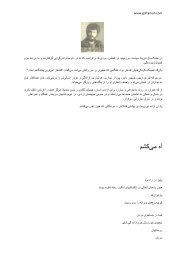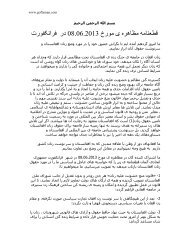Power-Sharing - Goftaman.com
Power-Sharing - Goftaman.com
Power-Sharing - Goftaman.com
- No tags were found...
You also want an ePaper? Increase the reach of your titles
YUMPU automatically turns print PDFs into web optimized ePapers that Google loves.
INTRODUCTION:THE AFGHANISTAN COMPACTBefore the terrorist attacks of September 11, 2001, and all that followed, Afghans and thehandful of internationals working on Afghanistan could hardly have imagined beingfortunate enough to confront today’s problems. The Bonn Agreement of December 2001providing for the “reestablishment of permanent government institutions” in Afghanistanwas fully <strong>com</strong>pleted with the adoption of a constitution in January 2004, the election ofPresident Hamid Karzai in October 2004, and the formation of the National Assembly inDecember 2005.From January 31 to February 1, 2006, President Karzai, UN Secretary-GeneralKofi Annan, and British Prime Minister Tony Blair presided over a conference in Londonof about sixty states and international organizations that issued the Afghanistan Compact,setting forth both the international <strong>com</strong>munity’s <strong>com</strong>mitment to Afghanistan andAfghanistan’s <strong>com</strong>mitment to state-building and reform over the next five years. The<strong>com</strong>pact supports the Afghan National Development Strategy (ANDS), an interimversion of which (I-ANDS) the Afghan government presented at the conference. 1 The<strong>com</strong>pact provides a strategy for building an effective, accountable state in Afghanistan,with targets for improvements in security, governance, and development, includingmeasures for reducing the narcotics economy and promoting regional cooperation. 2 The<strong>com</strong>pact also prescribes ways for the Afghan government and donors to make aid moreeffective and establishes a mechanism to monitor adherence to the timelines andbenchmarks. The <strong>com</strong>pact places responsibility for meeting these goals on thegovernment of Afghanistan, which can easily be held accountable, and the “international<strong>com</strong>munity,” which cannot be. The United States, United Kingdom, and other donorsstrongly opposed language in the <strong>com</strong>pact that would have held those present at theLondon conference (listed in a <strong>com</strong>pact annex), rather than an abstract entity, responsiblefor implementation.1 The Afghanistan Compact and the I-ANDS are available at www.ands.gov.af.2 For this conceptual framework for peace building, see Barnett R. Rubin, “Constructing Sovereignty forSecurity,” Survival, Vol. 47, No. 4 (Winter 2005), pp. 93–106.1
















